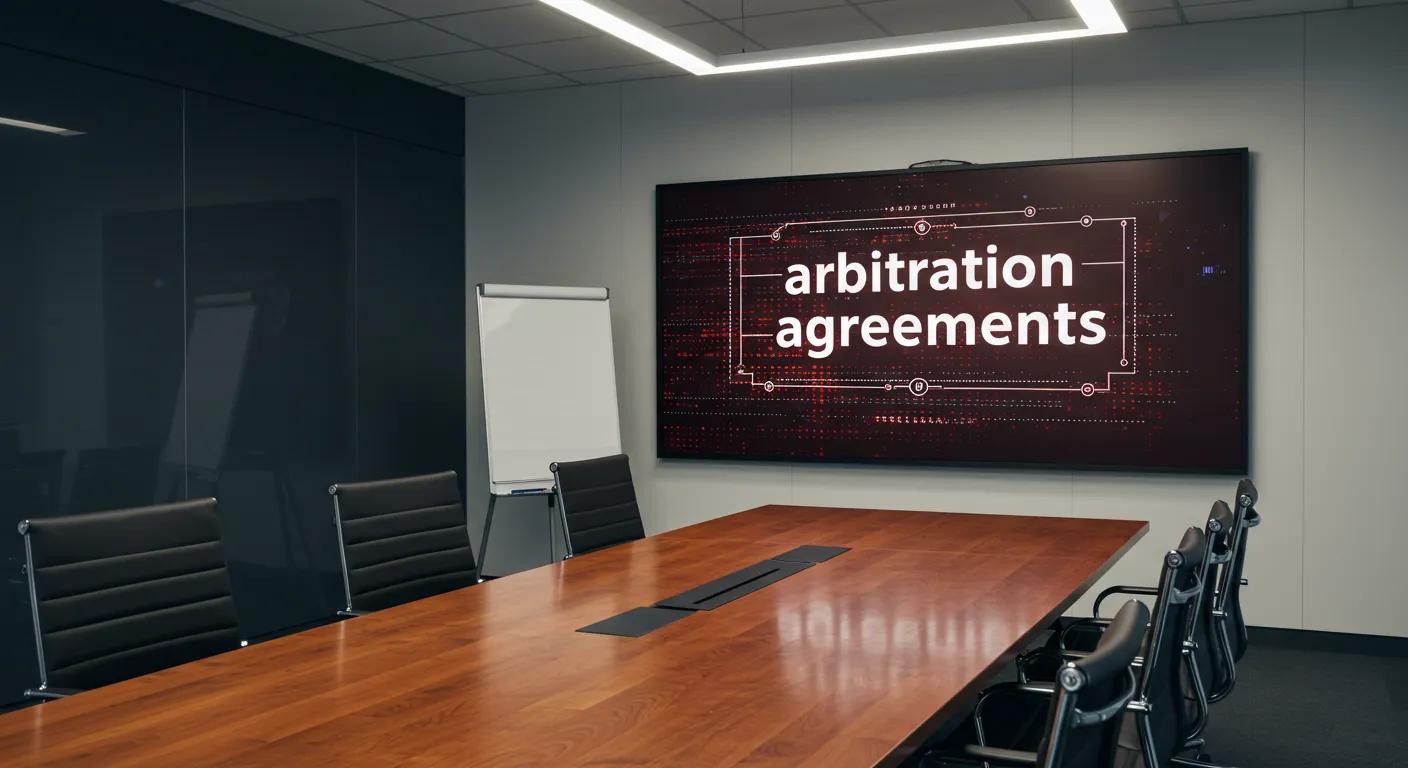The Role of Arbitrators in Resolving Commercial Disputes: How Arbitration Benefits Businesses
Arbitration has become a crucial method for resolving commercial disputes without lengthy litigation. Companies worldwide rely on arbitration to resolve conflicts efficiently, protect confidential information, and reduce legal costs. This article explains the arbitration process, its benefits for companies, how to choose an arbitrator, and how arbitration agreements impact dispute resolution. It also explores the enforcement of arbitration awards, the overall efficiency of arbitration, and its place among alternative dispute resolution methods. By understanding these aspects, legal professionals and businesses can better navigate commercial disputes with arbitration. For further guidance, please contact mcneal.law.
Transitioning from traditional litigation, arbitration provides a flexible and cost-effective way to address modern commercial needs while upholding principles of natural justice and efficiency.
What Is the Arbitration Process in Business Disputes?
The arbitration process is a structured method in which an impartial arbitrator or a panel reviews the facts and evidence presented by disputing parties and renders a binding decision. Unlike litigation and mediation, arbitration generally produces a final, enforceable award with limited judicial review. This section outlines its primary components and key steps, emphasizing procedural fairness, confidentiality, and efficiency.
How Does Arbitration Differ From Litigation and Mediation?
Arbitration offers a private and less formal forum with finality and enforceability. In contrast, litigation involves strict court procedures and can be lengthy and expensive, while mediation is non-binding and depends on mutual agreement. The arbitration process limits public disclosure of business-sensitive information, avoids extensive procedural delays, and typically concludes faster than court cases.
What Are the Key Steps in Commercial Arbitration?
Key steps include: • Initiating arbitration under an existing arbitration clause, • Selecting an arbitrator, • Conducting a preliminary conference to set timelines, • Submitting briefs and evidence, • Holding a hearing, and • Issuing a final decision or award.
These steps follow established rules—such as the Federal Arbitration Act or guidelines from the International Chamber of Commerce—to ensure the process remains balanced and focused.
How Is Confidentiality Maintained During Arbitration?
Confidentiality is preserved through stringent procedural controls and specific contractual clauses embedded in arbitration agreements. All submissions, evidence, and hearings are kept private, shielding trade secrets and sensitive negotiations from competitors and the public. This protection is a major advantage for companies concerned with safeguarding their reputation and competitive edge.
What Are the Benefits of Arbitration for Companies in Commercial Disputes?

Arbitration offers significant benefits in commercial disputes by reducing time and costs, providing a flexible framework and safeguarding confidentiality. Its final and binding nature helps preserve business relationships and minimizes disruptions.
How Does Arbitration Save Time and Reduce Costs Compared to Court Cases?
Arbitration circumvents many delays typical in litigation, such as extensive discovery and rigid court scheduling. The more direct process typically concludes within months, resulting in lower attorney fees and administrative expenses. Many businesses report substantial savings compared to the higher costs associated with traditional court cases.
Why Is Arbitration Considered More Flexible and Business-Friendly?
Its flexibility allows parties to choose arbitrators with specific commercial expertise and tailor procedures to suit the dispute. Scheduling hearings at mutually convenient times minimizes business disruption. By incorporating industry-specific rules, arbitration delivers solutions that are not only legally sound but also commercially practical.
How Does Arbitration Protect Business Confidentiality and Reputation?
Confidential hearings and non-public records protect sensitive business data and trade secrets. This discretion helps companies avoid negative publicity associated with open court proceedings and preserves vital long-term business relationships by fostering a less adversarial, more collaborative dispute resolution environment.
How to Choose an Arbitrator for Commercial Disputes?
Contact Us Today!
Selecting a qualified arbitrator is essential for a fair and effective resolution. An arbitrator’s credentials, experience in commercial law, and industry expertise greatly influence the dispute’s outcome. Businesses typically include arbitration clauses in contracts that define selection criteria.
What Qualifications and Expertise Should an Arbitrator Have?
A competent arbitrator usually has extensive experience in commercial law, a Juris Doctor degree, and certifications from reputable organizations like the Chartered Institute of Arbitrators. Practical experience as a legal practitioner or mediator is highly valued. Depending on the dispute, expertise in international trade, finance, or technology might also be required.
How Does the Selection Process Work in Arbitration Agreements?
The process starts with invoking an arbitration clause in the contract. Parties may jointly choose an arbitrator or rely on an institutional service to appoint one. This often involves reviewing candidate profiles and possibly conducting interviews. When disagreements occur during selection, arbitration rules may provide for a default mechanism or third-party intervention to secure a neutral arbitrator.
What Are the Differences Between Single and Panel Arbitrators?
A single arbitrator is generally more cost-effective and quicker for simpler disputes. However, complex cases may benefit from a panel—typically three arbitrators—who offer diverse perspectives and combined expertise. While a panel reduces the risk of bias and error, it may lead to increased costs and longer resolution times. Choosing between them depends on the dispute’s complexity and the parties’ priorities.
How Do Arbitration Agreements Impact Commercial Dispute Resolution?

Arbitration agreements set the rules and expectations for resolving disputes. They detail the process, confidentiality requirements, and enforcement mechanisms, which can significantly influence how disputes are handled.
What Are Common Clauses in Arbitration Agreements?
Typical clauses define: • The scope of disputes subject to arbitration, • The procedure for selecting arbitrators, • The arbitration location and language, and • Confidentiality obligations. They also specify the finality of the award and the methods of enforcement. Such clauses are critical to preventing further disputes about the process itself.
How Can Businesses Draft Effective Arbitration Clauses?
An effective clause is clear, comprehensive, and unambiguous. It should list the types of disputes covered, detail the arbitrator selection process, and include rules addressing potential conflicts of interest. Working with experienced legal professionals helps ensure these clauses meet both domestic and international standards.
When Should Arbitration Agreements Be Enforced or Challenged?
These agreements should be enforced when both parties voluntarily consent to arbitration as their mode of resolution. They may be challenged only if the terms are unconscionable, ambiguous, or if there is evidence of coercion in their formation. Courts usually give priority to the parties’ original intent to avoid litigation.
How Are Arbitration Awards Enforced in Commercial Disputes?
Once issued, an arbitration award functions as a binding judgment. Enforcement is supported by various legal mechanisms and international treaties that favor arbitration over prolonged litigation.
What Legal Mechanisms Support Enforcement of Arbitration Decisions?
Enforcement is backed by laws such as the Federal Arbitration Act in the United States and treaties like the New York Convention on the Recognition and Enforcement of Foreign Arbitral Awards. These frameworks require courts to uphold arbitration awards with very limited grounds for setting them aside, thus instilling confidence in the process.
How Does International Arbitration Differ in Award Enforcement?
International awards face challenges arising from varying legal systems and differing cultural practices. The New York Convention helps harmonize enforcement across over 160 countries, though differences in public policy or procedural issues can occasionally complicate matters. Businesses involved in cross-border transactions must account for these challenges by selecting arbitrators with global expertise.
What Challenges Can Arise in Enforcing Arbitration Awards?
Potential challenges include judicial delays, local resistance to award enforcement, and questions regarding the arbitral tribunal’s jurisdiction. In some cases, efforts to set aside an award on grounds such as fraud or due process violations can prolong resolution. Nonetheless, the overall efficiency and finality of arbitration awards make them a preferred alternative to court litigation.
How Does Arbitration Resolve Business Conflicts Efficiently?

Arbitration is designed to resolve business conflicts without the formality and delays of traditional court processes. It streamlines dispute resolution and emphasizes practical, mutually acceptable outcomes that allow businesses to continue operating smoothly.
What Role Do Arbitrators Play in Facilitating Fair Settlements?
Arbitrators are not merely judges; they also facilitate negotiations and guide parties toward settlements. Their expert review of evidence and ability to mediate contentious issues help defuse tensions and foster consensus, ensuring that both sides are fairly heard before a binding decision is made.
How Does Arbitration Encourage Collaborative Dispute Resolution?
The process often incorporates elements of mediation to promote open dialogue and mutual understanding. By encouraging cooperation and reducing hostility, arbitration helps establish lasting resolutions that maintain business relationships beyond the dispute.
What Are Examples of Successful Commercial Arbitration Cases?
Numerous cases demonstrate arbitration’s effectiveness. In technology and finance, international arbitration has resolved multi-million-dollar disputes swiftly, preserving sensitive information and investor confidence. Similarly, disputes in construction or corporate mergers have been resolved efficiently, allowing companies to adapt quickly without protracted litigation.
What Are Alternative Dispute Resolution Methods Besides Arbitration?
Besides arbitration, alternative dispute resolution (ADR) includes mediation, conciliation, and hybrid methods that combine elements of negotiation and adjudication. While arbitration is binding and efficient, other ADR methods can sometimes better suit specific disputes.
How Does Mediation Complement Arbitration in Business Disputes?
Mediation offers a non-binding forum where parties can negotiate and reach a mutually acceptable settlement. When used alongside arbitration, mediation can help resolve issues early, reducing the need for a full binding decision and often resulting in more durable agreements.
When Is Litigation Still Necessary Over Arbitration?
Although arbitration provides many benefits, litigation remains necessary for disputes involving complex statutory rights or significant public policy issues. Litigation may also be required when arbitration awards are challenged or when parties have not previously agreed to arbitration.
What Are Hybrid ADR Approaches Used in Commercial Conflicts?
Hybrid approaches, such as med-arb, combine the best aspects of mediation and arbitration. Initially, mediation is used to resolve as many issues as possible; if that fails, the process shifts to binding arbitration. This method is especially useful in maintaining ongoing business partnerships while ensuring a final resolution when negotiations stall.
Frequently Asked Questions
Q: What makes arbitration a preferred method for resolving commercial disputes?
A: Arbitration offers a private, efficient, and cost-effective alternative to court litigation. It provides final, enforceable awards while preserving confidentiality and business relationships.
Q: How does the confidentiality of arbitration benefit companies?
A: The confidential nature of arbitration protects sensitive business information and trade secrets, reducing the risk of negative publicity and competitive harm.
Q: When should a business consider including an arbitration clause in its contracts?
A: Including an arbitration clause from the outset sets clear dispute resolution expectations and minimizes the likelihood of prolonged litigation, while safeguarding confidentiality.
Q: What is the role of an arbitrator in ensuring a fair outcome?
A: Arbitrators impartially assess evidence, facilitate discussions, and apply legal principles to issue fair, binding decisions. Their expertise ensures balanced resolutions for all parties involved.
Q: How are international arbitration awards enforced across different jurisdictions?
A: Enforcement is typically supported by treaties such as the New York Convention, requiring signatory countries to recognize and enforce arbitration awards, despite differing legal systems.
Q: Can mediation be used in conjunction with arbitration for commercial disputes?
A: Yes, mediation is often used alongside arbitration to resolve issues amicably before resorting to a binding decision, which can shorten the resolution process.
Q: What are the potential drawbacks or challenges associated with arbitration?
A: Challenges include limited judicial review, potential arbitrator bias, higher costs in complex cases, and occasional enforcement difficulties. Despite these, arbitration remains highly effective compared to traditional litigation.
Final Thoughts
Arbitration is a vital tool for resolving commercial disputes in a manner that is both efficient and cost-effective. Its structured and confidential process allows businesses to settle conflicts without the delays and public exposure of court litigation. By incorporating well-drafted arbitration clauses, companies can lower legal expenses, safeguard sensitive information, and maintain key business relationships. As global commerce grows more complex, efficient and adaptable methods like arbitration will remain essential in ensuring stability and fairness in business operations.
| Attribute | Litigation | Arbitration | Mediation |
|---|---|---|---|
| Time Efficiency | Long (months/years) | Shorter (months) | Variable |
| Cost | High | Lower | Lowest |
| Confidentiality | Public Record | Private | Private |
| Finality | Final; subject to appeals | Binding, minimal appeals | Non-binding |
| Flexibility | Rigid court procedures | Customizable process | Consensus-based |
The table compares key attributes of dispute resolution methods, highlighting the balance of efficiency, cost-effectiveness, and confidentiality that arbitration provides.
Contact McNeal Law
The role of arbitrators continues to evolve as businesses seek faster, more private, and tailored solutions. Whether addressing simple contractual disagreements or complex international trade issues, arbitrators offer the legal expertise and impartial oversight necessary to guide parties to fair resolutions. By leveraging the benefits of arbitration, companies protect their confidential information, reduce legal costs, and maintain critical commercial relationships. In today’s competitive global market, the importance of efficient and flexible dispute resolution methods is set to rise.
